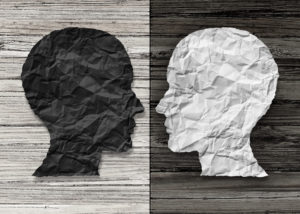Addiction and depression are all too common in the United States. And devastatingly, many individuals suffer from both disorders. As a result, the effects of addiction and depression can intensify, creating a cycle of negative thoughts and behaviors that impact virtually all aspects of a person’s life, as well as those closest to them.
Here at Northbound, we specialize in alcohol and drug addiction treatment with co-occurring mental health disorders. Many of our clients struggle with major depressive disorder (MDD), persistent depressive disorder, seasonal affective disorder (SAD), and manic depression (bipolar disorder).
Part of why our rehab centers have such high success rates is because we’re able to effectively identify the root cause of a person’s substance abuse problem. In many instances, it’s related to mental illness, which is why understanding the link between depression and addiction is so crucial.
Depression and Addiction: How Are They Related?
Feelings of sadness and negativity are normal human emotions. Most people can expect to experience these emotions from time to time, and they aren’t necessarily indicative of clinical depression.
For instance, if you recently lost a loved one, it wouldn’t be abnormal or a cause for concern if you experience feelings of grief. Having said that, someone who grieves for an extended period or has difficulty moving on from loss may suffer from depression.
So, how do depression and substance abuse connect? Among adolescents between ages 12 to 17, 13% of those with substance abuse disorder (SUD) had a major depressive episode within the last year. Also, adolescents who had a major depressive episode were almost twice as likely to use illegal drugs than those who didn’t. Similarly, nearly a quarter of adults with SUD also suffer from depression1.
With high rates of co-occurring substance abuse disorder and depression, the link between the two cannot be ignored when it comes to treatment. In order to effectively overcome addiction, the underlying cause (or causes) must be not only addressed but also treated. With healthy coping mechanisms in place, recovering addicts can process their emotions without turning to drugs or alcohol.
What Comes First, Addiction or Depression?
As we mentioned, depression can lead to addiction. Many depressed individuals use substances as a way to cope with or forget about their negative thoughts and emotions. This can result in a dependence on drugs or alcohol, and eventually, a substance abuse problem.
However, depression isn’t always the first to appear with co-occurring disorders. In some instances, severe SUD can result in depression. Since addictive behavior tends to disrupt all facets of a person’s life — including their relationships, job, finances, and living situation — the situational effects often lead to depression2.
Still, the causes of addiction and depression are sometimes unclear. With years (or decades) of substance abuse and a co-occurring mental health condition, the timeline can become muddled, making it difficult to pinpoint when each disorder started. In any case, treatment should address both conditions simultaneously.
Why Dual Diagnosis Treatment Is Essential
Mental illness and substance abuse often go hand-in-hand3. It’s not just depression and addiction, either — there are virtually endless combinations of co-occurring disorders. Some of the most common include codependency and alcoholism, stress and drug addiction, bipolar disorder and alcoholism, and benzodiazepines and anxiety.
Treating one of these conditions while ignoring the other is ineffective. That’s why it’s vital for providers to thoroughly evaluate patients and make a proper dual diagnosis for co-occurring disorders when appropriate.
First implemented in the 1980s, dual diagnosis treatment is a relatively new approach to drug and alcohol rehabilitation. And while the modality is crucial for treating people who suffer from both depression and addiction, few rehab centers are equipped to handle both at once.
Northbound is proud to offer integrated dual diagnosis treatment programs for clients struggling with addiction and depression. We’ve been helping individuals recover from and eliminate addictive behavior for over three decades, and dual diagnosis treatment is a critical component of many of our success stories. To learn more about how to help someone with drug addiction & depression, head over to our blog.
Northbound’s Approach to Dual Diagnosis Rehab
Northbound Treatment’s approach to dual diagnosis rehab involves a thorough understanding of the link between depression and addiction. Our experienced staff of clinicians, nurses, addiction counselors, therapists, and coaches work together at every step of the recovery process. We look at the deeply rooted causes of both disorders and help our clients identify triggers, develop coping strategies, and create practical, realistic plans for long-term sobriety.
Just like our clients, every treatment plan is unique. We work with each individual to develop a program that aligns with their needs, lifestyle, history, and goals. Some dual diagnosis clients participate in our Collegebound® program, in which they enroll in school while getting treatment. Others take part in our Careerbound®, taking steps to re-enter the workforce. Northbound also offers a residential Christian-based LINKS program, a family program, a music program, and many other programs that can be implemented into a customizable treatment plan.
Our multi-faceted approach to dual diagnosis includes a number of therapies. A client’s plan typically involves one-on-one therapy, group counseling, cognitive-behavioral therapy, and experiential therapies. In some cases, medication is incorporated into treatment plans to help individuals find relief from depression while overcoming addiction.
Medication for Depression
Though medication can’t actually “cure” depression, it can be beneficial in relieving symptoms and managing the condition in both the short- and long-term. For this reason, it’s sometimes implemented into dual diagnosis treatment.
Northbound’s philosophy is generally to limit the use of medication unless it’s necessary to effectively treat a client. To ensure medication is the right approach, we carefully assess our patients to identify depression and its severity. We also work with psychiatric referrals when someone’s been previously diagnosed.
Bear in mind that it can take some time for depression medications to begin “working.” The effects range among individuals, often providing relief but sometimes resulting in adverse effects. Administering them as part of an abstinence-based rehab program allows for stabilization in a clinically supervised setting. If a client needs to adjust their dose, ween off a medication, or switch to a new one, they can do so safely with as little discomfort as possible.
Esteem-Building for Depression and Addiction
Northbound utilizes holistic treatment methods, which focus on physical, mental, emotional, and spiritual healing. That’s why treatment programs at our Orange County rehab facilities include various esteem-building activities.
This may involve physical fitness sessions, relaxation techniques, life skills classes, art classes, grocery shopping, and social events with a community of sober peers. By regulating and normalizing responses to everyday occurrences — like running errands or hanging out with friends — our clients are able to ease back into work, school, and home life.
These esteem-building activities are integrated into a daily schedule along with individual therapy, addiction coaching, and group counseling sessions. We’ve found that a daily routine is exceedingly important for esteem-building and emotional growth — especially for those struggling with co-occurring disorders. Also, substantial research supports the notion that fresh air, sunlight, and exercise help relieve depression.
The Full Continuum of Care
Northbound Treatment proudly offers a full continuum of care for substance abuse. Aside from dual diagnosis treatment, this means clients can receive care at our facilities during all stages of rehab.
Most begin with medically supervised detox at our accredited 180 Detox center here in Orange County. Next, they transition to a residential rehab program where they’ll work toward sobriety in a comfortable, secure environment. Then clients begin outpatient treatment, during which they continue a rehab program while living at home. Finally, recovering addicts can receive ongoing addiction support services as they adjust to the realities of life-long sobriety.
Start Addiction Treatment Today
Addiction and depression can be all-consuming, but they don’t have to control your life. Dual diagnosis treatment works for co-occurring disorders — we’ve seen the results first-hand time and time again. With a comprehensive treatment program, you can find relief from depression and live free from addiction.
Northbound Treatment believes in providing accessible, affordable care at all levels. We’re an in-network provider for most insurance plans in the Orange County region, and we can work with you on a personalized payment plan for any remaining costs.
If you or a loved one suffer from co-occurring addiction and depression, please reach out today. Call (888) 978-8649 or fill out our admissions form to take the first step to recovery.
External sources:
1. https://www.samhsa.gov/data/sites/default/files/cbhsq-reports/NSDUHFFR2017/NSDUHFFR2017.pdf
3. https://www.drugabuse.gov/drug-topics/health-consequences-drug-misuse/mental-health-effects











